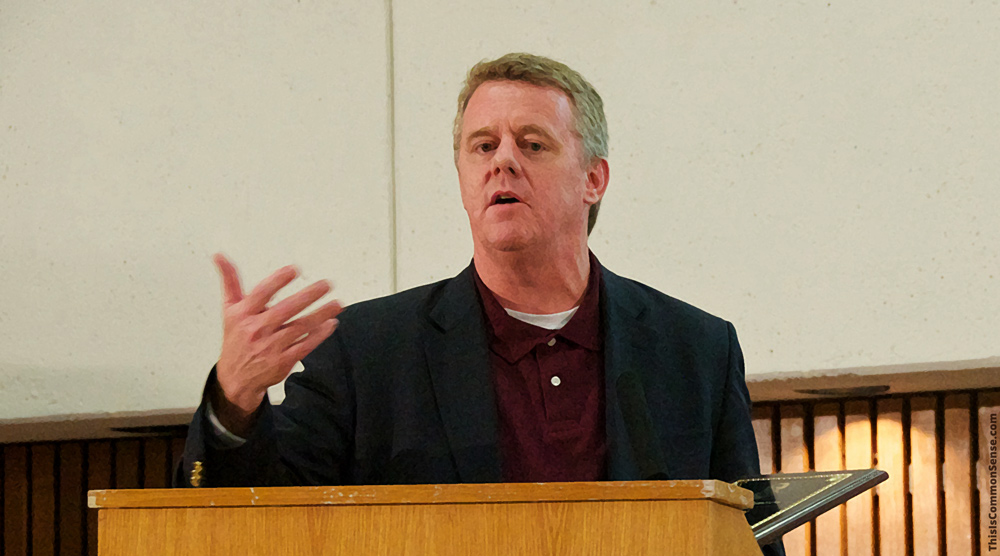Time sure flies when you’re having fun.
Today is my birthday. I am 60, and thus begin my 61st year on this planet.
For the last four decades — my entire adult life — I’ve worked in politics. That might not seem like much fun. Politics is a constant struggle, a slog. But working for freedom — in one crusade or another — has been both fulfilling and fun.
Maybe it’s because, as a friend once accused, I’m a pathological optimist. Maybe it’s a whole lot more than that.
I’ve worked through nights, bleary-eyed, peering at voter registration lists. I’ve circulated petitions in 100-degree heat and freezing temperatures. I’ve been vilified in the press — oh, and lionized, too. I’ve been both hounded and praised. I’ve been imprisoned — and threatened with more of the same.
What was I thinking?
I guess I thought, and indeed still think, that we are called upon to do what we believe is right — come what may. Freedom isn’t free.

It’s been hard sometimes. I was in prison for five and a half months when my oldest was only a year old. I was there for refusing to register for the draft.
What was I thinking?
In the words of then-presidential candidate Ronald Reagan, I thought: “The draft or draft registration destroys the very values our society is committed to defending.” I could not stand idly by while those cherished values were destroyed, nor certainly be any party to it.
My re-education in federal custody fortunately didn’t take. And the road I took has made all the difference.
For instance, I met Ron Paul when, as a slightly younger congressman, he testified at my trial. Three years later, in 1988, I nominated him to run for president on the Libertarian Party ticket.
At a meeting in April of that year, the task of putting Congressman Paul on the ballot for president was handed to me. The next morning I was awakened by a phone call on the home line — at 6:00 am! And for the next six months the phone never stopped ringing.
I remember my wife calling me at the office to tell me our new home phone number — and urging me not to give it out to people! She’s a lot smarter than I am.
Working with wonderful people across the country, we successfully placed Ron on the ballot in 47 states and the District of Columbia. And Guam. Believe me, it took a lot of hours, daylight and late night.
What was I thinking?
I was thinking that given a choice, people would choose greater freedom, limited government and personal responsibility. We didn’t win, of course. But we weren’t through trying.
Howie Rich and Eric O’Keefe noticed my work on the petition drives and offered me a job running the Tax Accountability Amendment in Illinois. Half a million voters signed petitions to put the measure on the ballot. Then, at 77 percent in the polls, the Illinois Supreme Court took it off the ballot. (The same thing happened again four years later with a term limits petition.)
But, suddenly, freedom was breaking out around the world. The Berlin Wall came down. Czechs poured into the streets. Estonians were singing. We watched with inspiration and then horror as students rallied for weeks in Tiananmen Square only for the Butchers of Beijing to crush the peaceful protest with deadly force. The Chinese people’s dream was our dream; the desire for freedom — and the citizen control of government needed to preserve it — was universal.
The end of the Cold War allowed Americans to finally cast a full glance at city hall, at the state capitol, at Washington, D.C. We did not like what we saw.
Along came term limits.
In 1992, I was hired to run U.S. Term Limits. We were able to help activists in 14 states get on the ballot — the most states to ever vote on a single issue on a single day. All 14 states passed term limits, including my home state of Arkansas.
The issue continued to win at the ballot box in the states and in hundreds of cities and counties — from Wyoming to New York City. Politicians sued. Speaker of the House Tom Foley was one.
In 1994, Republicans swept to a majority in the U.S. House for the first time in 40 years, in no small part as a result of their embrace of term limitation. One of the biggest upsets was Foley, the only Speaker defeated for re-election since the Civil War, a victim of his own lawsuit to overturn his state’s voters.
And term limits — a case from Arkansas, not Foley’s — went to the Supreme Court. Unfortunately, in a narrow 5 to 4 decision, the court struck down Arkansas’s term limits law, and by implication laws enacted in 22 other states.
What was I thinking?
On the steps of the Supreme Court, I told reporters:
All over Washington today, the politicians and the power brokers are happy. You can hear the sound of champagne corks popping. I have a simple message to them. Drink up; you’re outnumbered.
Term limits went nowhere in Congress, of course. There were a few principled supporters, but most wanted a career of perks and power. It’s very seductive.
I was on the wrong side of an 80/20 issue. I was with the 80 percent of Americans for term limits.
What an amazing situation: Our representatives refuse to do what 80 percent of the people want. In essence, they refuse to give back the power we’ve loaned to them.
The issue won’t go away. A decade ago, if you went to a Tea Party event, you would see the homemade two-word signs: Term Limits! And then-President Barack Obama insisted on the importance of term limits for Congress and for executives in foreign countries, and he regarded it as a matter of course: it’s tyranny without them.
Now, a very different president, Donald Trump, has repeated the importance of legislative term limits. It was one reason many people voted for him. And best for republican governance.
Though, a lot of people in power sure pretend to think the opposite.

The battle has not been lost or abandoned. I still sit on the board of directors of U.S. Term Limits and help out where I can in a very aggressive national campaign to bypass Congress by garnering 34 states to call a convention (under Article V of the Constitution) to propose a constitutional amendment for ratification by the states.
Frankly, the only negative result of term limits sweeping those states with initiative and referendum has been the backlash. Legislators and their favored special interests have launched concerted attacks on the initiative process for enabling the people to do such a thing in the first place.
What was I thinking?
The initiative process is the most effective protection we citizens have from government gone wild.
Regular readers of Common Sense know my more recent work in helping citizens across the country petition to put initiatives on the ballot to protect homes and small businesses from being taken through eminent domain abuse, enact state spending limits, defeat ever-increasing gas taxes, protect citizen-only voting and enact criminal justice reform in places like Ferguson, Missouri.
A decade ago, in the spirit of “no good deed goes unpunished” and in the cesspool that has become our politics, Oklahoma Attorney General Drew Edmondson indicted three of us, The Oklahoma Three, for “conspiracy to defraud the state” over a 2006 initiative there.
What was I thinking?
The Oklahoma powers-that-be were scared. And they did not want us taking a limit on government spending to a public vote.
And perhaps, for a moment or two, I may have thought “I’m getting too old for this.”
We were innocent of the charge and we fought back. After more than a year and a half with a possible ten-year prison term hanging over our heads, the charges were dismissed. The AG had campaigned in the press that we were guilty, but he had repeatedly blocked our case from going before a judge for a preliminary hearing to determine if there was enough evidence to even go to a trial.
No such hearing was ever completed. Meanwhile, the state’s petition law was struck down as unconstitutional in federal court.
The AG thought he could threaten us into submission. He had offered my co-defendant Susan Johnson a deal: plead guilty and all she’d get would be a small slap on the wrist.
Like so many unsung patriots in this country, she told him to stuff it.
What was she thinking?
All that is necessary for the triumph of good is for the majority of people — who are indeed good at heart — to stand up and be counted. The people are not the problem. They are the solution to the problem.
When government becomes Goliath, the initiative is the people’s slingshot.
In my recent travels around the world in support of freedom-centered democracy — citizen-controlled government — I’ve encountered truly courageous people in Hong Kong, Taiwan, and elsewhere. Everywhere the message is becoming clearer, at least to folks like you, advancing the cause.
Times are strange. Even scary. But I’ve never had more hope for the future. Together, I’m convinced we can leave our kids and grandkids an insurance policy. Not one that pays out money when we’re gone, but something they’ll need even more:
Freedom.
The key to restoring and protecting freedom? Give the intrinsic decency and the common sense of the American people a chance to prevail.
That’s what the initiative and referendum process is all about: an opportunity to place some measure of common sense on the public agenda, and when needed, to check the power of the high and mighty.
As I look back on my five decades, I’m thinking how proud and how lucky I am to serve as president of Citizens in Charge and Citizens in Charge Foundation, the only national organizations committed to protecting the right of citizens to initiative and referendum, and to lead the Liberty Initiative Fund, an organization that helps liberty-minded people advance ballot measures that expand liberty and constrain government.
Many times through the years I’ve asked you to make a sacrifice to support our mutual cause. Your generosity has made the difference. Again today, I ask for your help.
Please support this online voice.
For 20 years, this daily Common Sense commentary hasn’t skipped a weekday, and now our brand spanking new, This Week in Common Sense video/audio podcast is also at thisiscommonsense.com. This has been the hub of my political activism since 1999. Here I keep the lines of communication open with freedom-minded folk everywhere, and when I notice an opportunity, from where I explain how we can best advance our cause.
But a website and daily commentary — and now a weekly podcast — take not only time, but money. To keep it going, and even expand our reach on social media, your help now would be just that: Help. Now. For the future.
Don’t donate $60 to This Is Common Sense just because I’m turning 60. If that were the only motivation, I’d want you to give $59 or $33 or $21. I’d feel younger.
Give whatever you can afford — $60 or $6 or $600 — because your liberty and mine, as well as freedom for our loved ones, is worth every penny.
And right now I can help increase the bang of your bucks. A generous donor has promised to match, dollar for dollar, your donation — up to $15,000. So whether your donation is a 6 followed by one zero, two, or three, you’ll know that the effect will be doubled.
What a deal!
I urge you to not put this aside. No matter what you contribute, please do it right now. After all, we’re not getting any younger.
As a lover of freedom and not omnipotent government, you are already way ahead of the crowd! What are you thinking?
I hope you’re thinking that you will join me by supporting Common Sense, to restore liberty, to put freedom first.
This is Common Sense. And I’m seventh-decade-advancing* Paul Jacob.

P.S. When you make a financial gift, your spouse, your friends, your neighbors and co-workers may ask you: What were you thinking?
So tell them. Freedom needs not only your support, but theirs.
* If my seventh-decade (!) reality inspires you to increase your donation from $60 to $70 — or from $600 to $700 — the whole idea of moving forward would add just an extra bit of pizazz.

—
See all recent commentary
(simplified and organized)

3 replies on “What Was I Thinking?”
HAPPY BIRTHDAY to you youngster…
Thanks much, Rick!
But always on the side of greater liberty